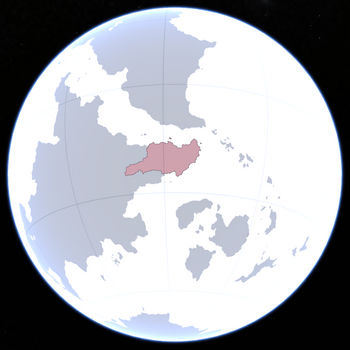Sizhou: Difference between revisions
| Line 86: | Line 86: | ||
===Sizhouan Revolution=== | ===Sizhouan Revolution=== | ||
===Contemporary History=== | |||
Revision as of 01:50, 21 March 2019
Socialist Republic of Sìzhōu Sìzhōu Shèhuì Zhǔyì Gònghéguó | |
|---|---|
|
Flag | |
 Location of Sìzhōu (red) in Artemia. | |
| Capital and largest city | Hǎijīng |
| Official languages | United Sizhouan |
| Demonym(s) | Sizhouan |
| Government | Socialist Republic |
• Premier | Premier Lin Lafang |
• Chairman of the Interim Assembly | Chairman Nakhan Kendri |
• General Secretary of the Worker's Party of Sizhou | General Secretary Mei Zhe'shan |
| Legislature | National People's Assembly |
| Establishment | |
• 1800 Unification Treaty | 1800 |
• Sizhouan Revolution | 1975 |
| Area | |
• Total | 1,411,301 km2 (544,906 sq mi) |
| Population | |
• 2017 census | 296373210 |
• Density | 210/km2 (543.9/sq mi) |
| GDP (nominal) | 2017 estimate |
• Total | S/ 2,400,623,001,000 |
• Per capita | S/ 8,100 |
| Gini (2017) | 5.7 low |
| Currency | Sizhouan Zhùyì (注) |
| Date format | dd-mm-yyyy |
| Driving side | right |
| Calling code | +975 |
| Internet TLD | .sz |
Sizhou (United Sizhouan: Sìzhōu), officially the Socialist Republic of Sizhou (Sìzhōu Shèhuì Zhǔyì Gònghéguó) is a country in Southeastern Ameriga, lying at the far eastern horn of the Southern sub-continent. At a population of 296,373,210 (2018), it is the most heavily populated country on the planet.
Up until the 19th century, Sizhou had historically consisted of a wide range of empires and cultures, culminating in the War of the Four Kingdoms. This resulted in the Unification Treaty, merging the four largest kingdoms along with the integration of several smaller kingdoms in the region. The monarchy of the Sizhouan Empire continued uninterrupted until the 1975 Sizhouan Revolution, at which time the Worker's Party of Sizhou led by Xao Zhe'shan wrested control of the country and established the current Socialist Republic of Sizhou.
Today, the sovereign state of Sizhou is a federal socialist republic led by a Premier along with the National Assembly of Sizhou. It is the strongest state today with an official communist, particularly Communist-Xaoist ideology, and the leading advocate of leftism abroad.
Etymology
Sizhou as a nation in and of itself did not historically exist until 1800, previously being known as the individual states which existed where it currently resides. Regardless, Sizhou had been used with some frequency to refer to the four largest states of the area, 四 (Si) being United Sizhouan for the number four, and 州 (Zhou) being United Sizhouan for state. After the merging of all the kingdoms of Sizhou, it was agreed upon in the Unification Treaty that this name be chosen as the name of the country.
